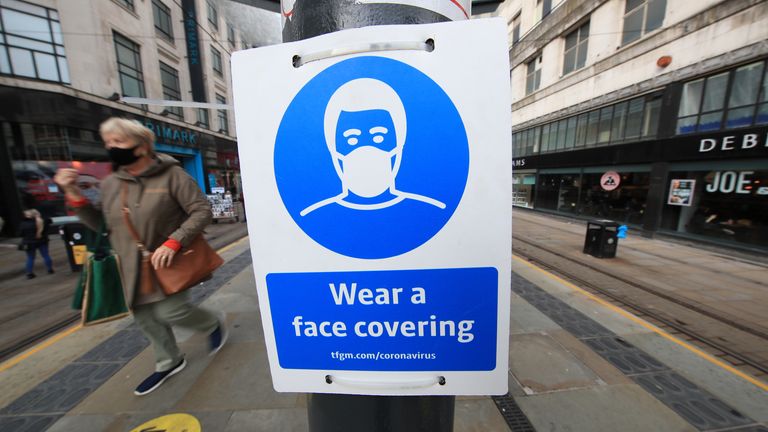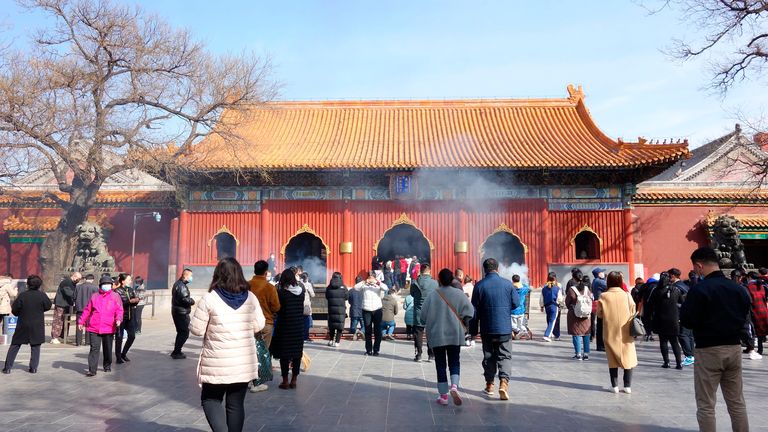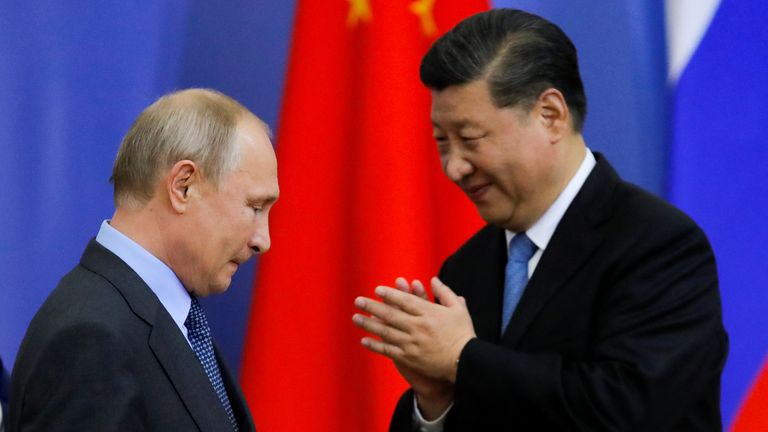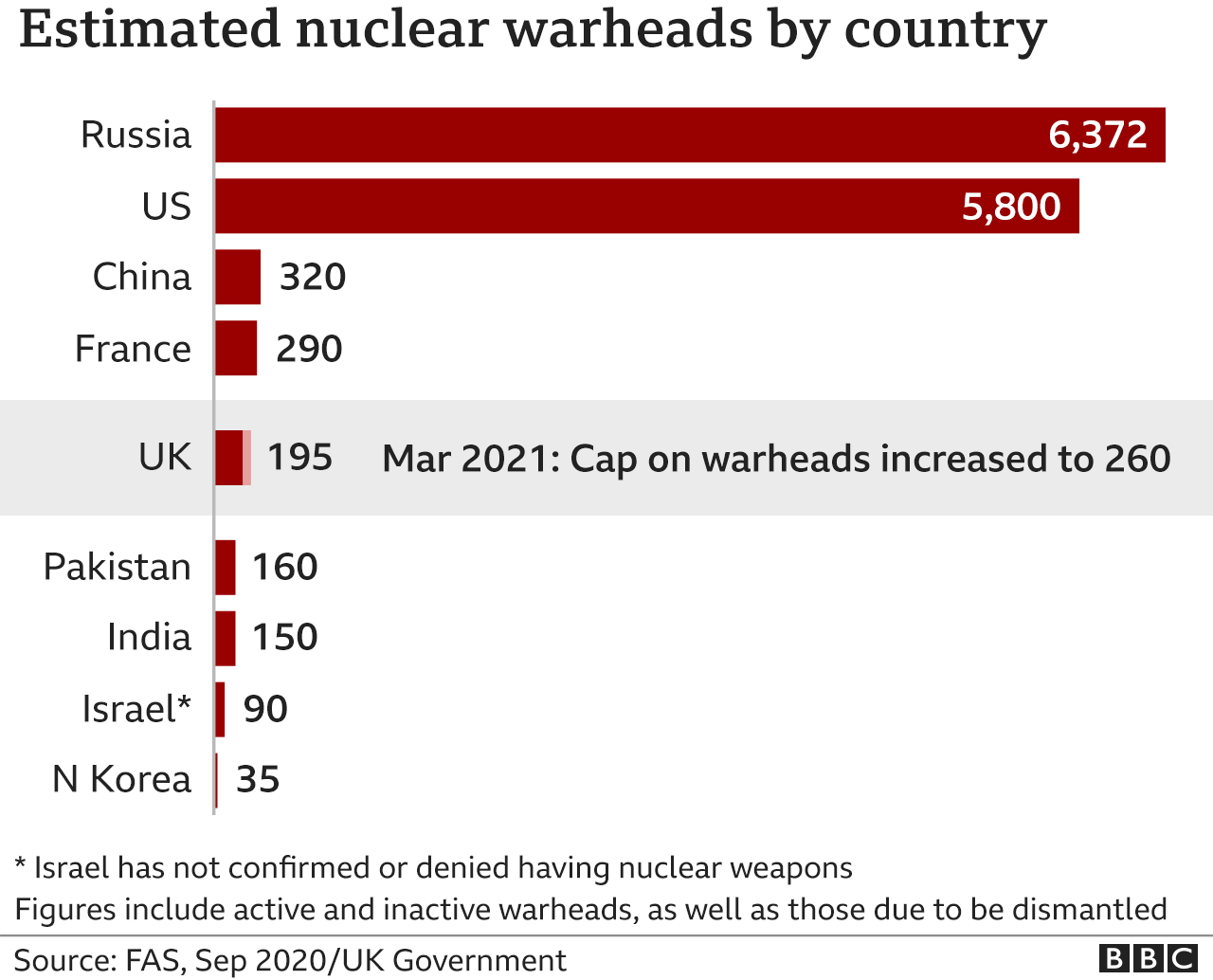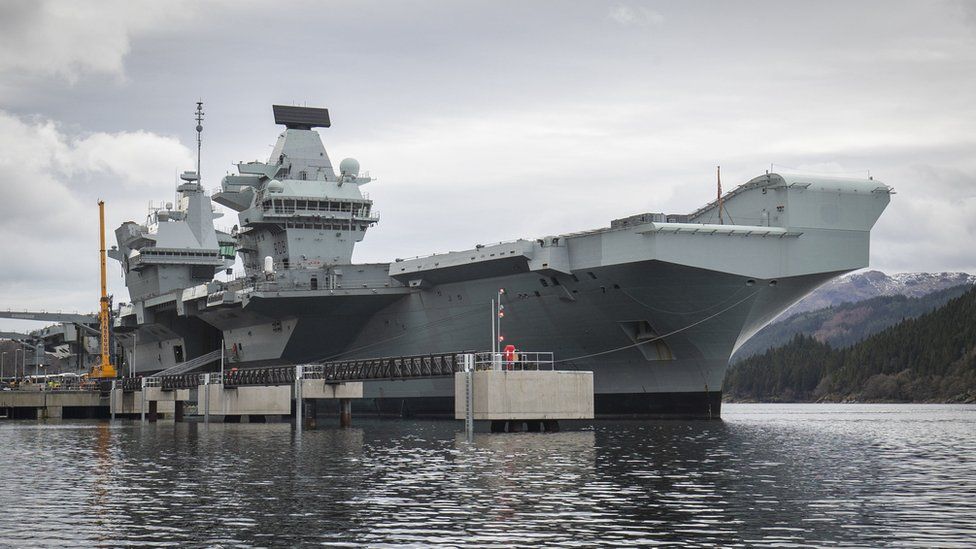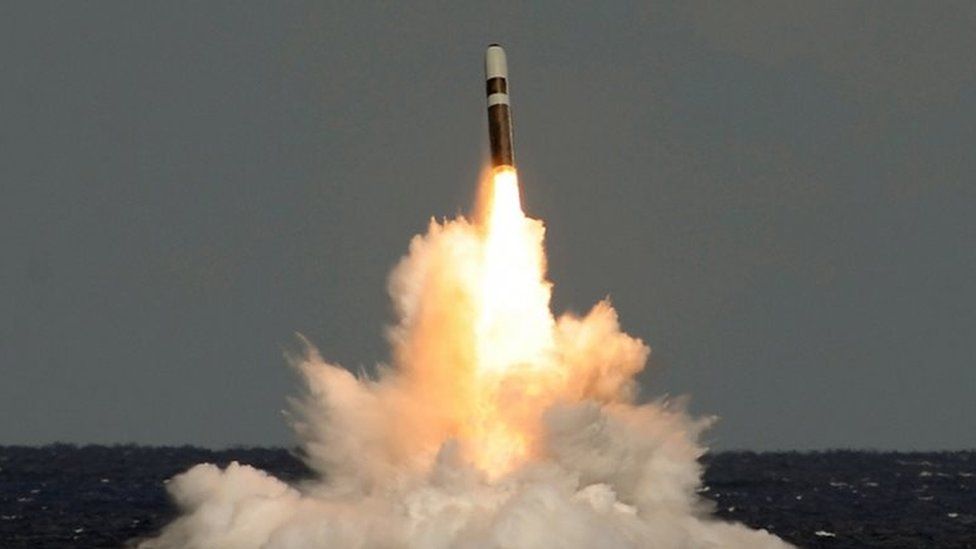The UK will reverse a reduction in its nuclear warheads and has raised the prospect of a nuclear response to catastrophic chemical, biological or even cyber threats as part of a policy overhaul released by Boris Johnson.
The significant shift in nuclear policy prompted questions from the Labour Party and condemnation from anti-nuclear weapons campaigners.
A Whitehall source told Sky News that the UK would "be an unapologetic nuclear power".
The Integrated Review, released on Tuesday, sets out how Britain hopes to shape a world where democracies can thrive, but is ready for one marked by increased conflict and division, with China seen as the biggest state threat to economic security.
Another pandemic is regarded as a "realistic possibility", while Russia is described as "the most acute threat" to UK security.
The Prime Minister revealed the conclusions of the most significant shake-up of UK foreign, defence and security policy since the Cold War.
"The overriding purpose of this review… is to make the United Kingdom stronger, safer and more prosperous while standing up for our values," he told the House of Commons.
"[It] describes how we will bolster our alliances, strengthen our capabilities, find new ways of reaching solutions and relearn the art of competing against states with opposing values."
He described China as posing a "great challenge for an open society like ours". But said the UK would also work with Beijing "where that is consistent with our values and interests".
This includes by building a stronger and positive economic relationship and in addressing climate change - a tricky balancing act.
The 114-page document outlines Britain's goals and challenges,which include:
• Tackling climate change and the loss of biodiversity is the top international priority
• A "tilt" to the Indo-Pacific region focused on strengthening diplomatic and trade links
• The precondition for "Global Britain" is the safety of British citizens and the security of the Euro-Atlantic region, which remains the prime focus of UK security
• An ambition to make the UK a "science and tech superpower" by 2030
• Shaping the international order of the future, with rules to protect democratic values in the real world as well as in cyberspace and space
• Building resilience in the UK to future emergencies
• Increased funding for spy agencies as part of efforts to counter the threat from terrorism
The shift on Britain's nuclear deterrent is one of the most notable aspects of the review.
It warned of a growing international threat from nuclear weapons, noting that some states are "significantly increasing and diversifying their nuclear arsenals".
In response to the "evolving security environment", the UK plans to reverse a reduction in its stockpile of Trident nuclear warheads. A new cap will rise to 260 from 180.
Britain's nuclear deterrent is delivered by four nuclear-armed submarines, which guarantees one boat will always be at sea.
The document said that the government would remain "deliberately ambiguous" about when, how and at what scale the UK would use nuclear weapons.
But it hinted at the possibility of the types of threats that would justify a nuclear response widening.
The review says that the UK would not use or threaten to use nuclear weapons against a country that is a member of the Non-Proliferation of Nuclear Weapons Treaty and is not a nuclear weapons state.
"However, we reserve the right to review this assurance if the future threat of weapons of mass destruction, such as chemical and biological capabilities, or emerging technologies that could have a comparable impact, makes it necessary," it says.
Sir Keir Starmer, the Labour leader, challenged Mr Johnson on the changes.
"I voted for the renewal of Trident and the Labour Party's support for nuclear deterrence is non-negotiable but this review breaks the goal of successive prime ministers and cross-party efforts to reduce our nuclear stockpile," he said.
"It doesn't explain when, why and for what strategic purpose. So the prime minister needs to answer that question today."
The International Campaign to Abolish Nuclear Weapons called the announcement a "dangerous U-turn" that would be a huge blow to allies in the non-proliferation treaty and would raise global security concerns.
The review featured four themes: geopolitical and geoeconomic shifts; systemic competition; rapid technological change; and transnational challenges such as climate change and global health risks.
It described a "realistic optimum scenario" as an "international order in which these trends can be managed effectively, with nations coming together to revive multilateral cooperation, strengthen global governance and harness the opportunities ahead for growth and prosperity".
The review warned though that the UK "must also prepare for the possibility that the post-COVID international order will be increasingly contested and fragmented, reducing global cooperation and making it harder to protect our interests and values".
China is described as a "systemic competitor", with its authoritarian system at odds with the values of the UK and other liberal democracies.
At the same time, its economic strength makes the country a valuable trading partner for the UK as it looks to enhance ties in the Indo-Pacific region after Brexit.
The review sets out this balancing act, describing how the UK seeks to continue its relationship with China while at the same time standing up for democratic values and strengthening resilience to security threats.
"The fact that China is an authoritarian state, with different values to ours, presents challenges for the UK and our allies," the review said.
"China will contribute more to global growth than any other country in the next decade with benefits to the global economy.
"China and the UK both benefit from bilateral trade and investment, but China also presents the biggest state-based threat to the UK's economic security."
In the section on transnational challenges, the review predicted that infectious disease outbreaks are likely to be more frequent over the next decade.
"Another novel pandemic remains a realistic possibility. On current trends, global deaths related to antimicrobial resistance will rise from 700,000 to 20 million per year by 2050," it warns.
The terrorist threat is still described as "major", with the main sources coming from Islamist, Northern Ireland-related far-right, far-left, anarchist and single-issue terrorism.
The review warns it is likely a terrorist group will launch a successful chemical, biological, radiological or nuclear attack in the coming nine years.
The document also described how the UK had to improve its ability to push back against attacks by hostile foreign states like Russia, China and Iran in the grey zone, under the threshold of war.
This includes cyber attacks and disinformation spread online.
Moving to counter mounting criticism about a cut to Britain's overseas aid spending because of the economic hit from coronavirus, Mr Johnson said the UK would return to spending 0.7% of national income on overseas aid, after reducing it to 0.5% - a move critics say fundamentally undermines the concept of "global Britain".
https://news.google.com/__i/rss/rd/articles/CBMikwFodHRwczovL25ld3Muc2t5LmNvbS9zdG9yeS9pbnRlZ3JhdGVkLXJldmlldy1icml0YWluLXJldmVyc2VzLXBsYW5uZWQtcmVkdWN0aW9uLW9mLW51Y2xlYXItd2FyaGVhZHMtYXMtaXQtd2FybnMtYWdhaW5zdC10aHJlYXRzLWZyb20tY2hpbmEtMTIyNDc1NzTSAZcBaHR0cHM6Ly9uZXdzLnNreS5jb20vc3RvcnkvYW1wL2ludGVncmF0ZWQtcmV2aWV3LWJyaXRhaW4tcmV2ZXJzZXMtcGxhbm5lZC1yZWR1Y3Rpb24tb2YtbnVjbGVhci13YXJoZWFkcy1hcy1pdC13YXJucy1hZ2FpbnN0LXRocmVhdHMtZnJvbS1jaGluYS0xMjI0NzU3NA?oc=5
2021-03-16 17:48:45Z
52781433636367

